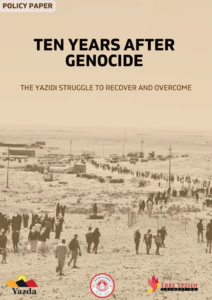The Basel, Rotterdam, and Stockholm Conventions “triple-COP” is a unique event. It brings together three distinct conventions that together protect human health and the environment by governing hazardous chemicals and wastes. Each treaty has a specific role and its own issues to address, although the joint meeting allows common issues to be tackled together, such as illegal trade and the provision of financial and technical resources.
This face-to-face meeting follows the 2021 virtual meeting that addressed operational and budget-related issues of the Conventions. It will be preceded by the high-level segment that convenes on 1 June 2022 in Stockholm, Sweden, prior to the Stockholm +50 Conference, commemorating the 50th anniversary of the UN Conference on the Human Environment.
The tripleCOP is comprised of:
- Basel Convention on the Control of Transboundary Movement of Certain Hazardous Wastes and Their Disposal, fifteenth Conference of the Parties (BC COP15)
- Rotterdam Convention on the Prior Informed Consent Procedure for Certain Hazardous Chemicals and Pesticides in International Trade, tenth COP (RC COP10)
- Stockholm Convention on Persistent Organic Pollutants (POPs), tenth COP (SC COP10)
High-level Segment
The objective of the High-level Segment on 1 June 2022 is to provide an interactive platform for ministers and other high-level delegates to exchange experiences and to show political leadership for renewed commitment towards the implementation of the Basel, Stockholm and Rotterdam Conventions. The High-level Segment aims to raise political awareness of and support for the Conventions, as well as promote a dialogue.
Under the theme “Global Agreements for a Healthy Planet: Sound management of chemicals and waste” the High-level Segment will address how the Basel, Rotterdam and Stockholm Conventions contribute to tackle the triple planetary environmental crisis of biodiversity loss, climate change, and pollution.
Basel Convention COP15
The Basel Convention (BC) identifies hazardous wastes and addresses the sound management of these wastes throughout their lifecycle, including trade and disposal. BC COP15 is the first meeting since the Ban Amendment entered into force. Broadly, this Amendment prohibits developed countries from sending hazardous wastes to developing countries.
BC COP15 will continue its work related to plastic wastes. The Basel Convention became the first international treaty to address plastic wastes in 2019 when it listed plastics in Annex II of the Convention, making plastics subject to the prior informed consent procedure. In short, it gave developing countries the ability to refuse plastic waste imports and more generally to have more information about shipments. BC COP15 will consider guidelines for the management of plastic wastes and inventories of these wastes, among other issues.
Rotterdam Convention COP10
The Rotterdam Convention provides crucial information to help developing countries manage hazardous chemicals. It enables countries to decide whether they want to import hazardous chemicals and pesticides listed in the Convention. When a chemical is listed in Annex III, countries receive information about it and its safe management and importers must provide their consent.
There are several chemicals that could be listed at this COP:
- Acetochlor
- Carbosulfan
- Chrysotile asbestos
- Decabromodiphenyl ether (decaBDE)
- Fenthion (ultra-low-volume (ULV) formulations at or above 640 g active ingredient/L)
- Liquid formulations containing paraquat dichloride at or above 276 g/L
- Perfluorooctanoic acid (PFOA), its salts and PFOA-related compounds
Several of these chemicals have been discussed in the past, but the COP was unable to reach consensus. There will also be a discussion of the effectiveness of the Convention.
Stockholm Convention COP10
The Stockholm Convention (SC) restricts and eliminates the production, use, trade, release, and storage of POPs. POPs are a particularly concerning group of chemicals warranting global action because they are capable of long-range environmental transport and are found in environments and in peoples’ bodies far from where they were produced or used. They remain in the environment for long periods, accumulate in the fatty tissue of humans and wildlife, and have harmful impacts on human health and the environment.
When a chemical is listed in Annex A, B, and/or C of the Stockholm Convention, its production and used could be eliminated (Annex A), restricted (Annex B), and/or measures taken to reduce unintentional releases (Annex C).
SC COP10 will consider listing a new POP in the Convention: perfluorohexane sulfonic acid (PFHxS), its salts and PFHxS-related compounds. These chemicals have been used in firefighting foam and carpet treatment solutions. It was once widely used by 3M as a stain and water repellent but was phased out due to U.S. Environmental Protection Agency regulations. The COP will consider whether to list these chemicals in Annex A, which will eliminate production and use.
The COPs will convene from 6-17 June 2022 in Geneva, Switzerland.




